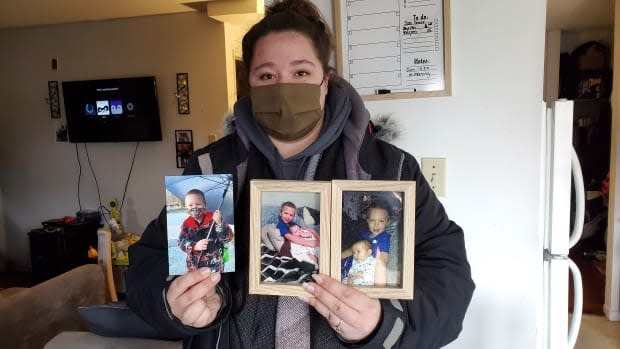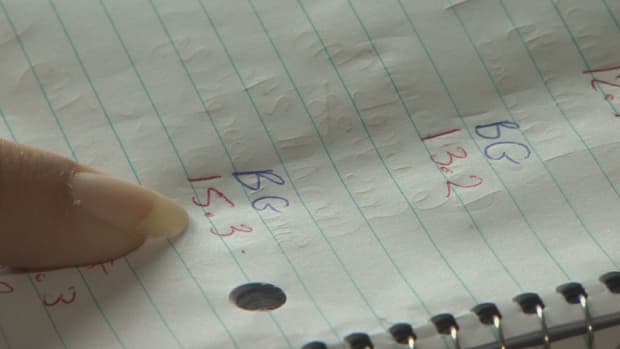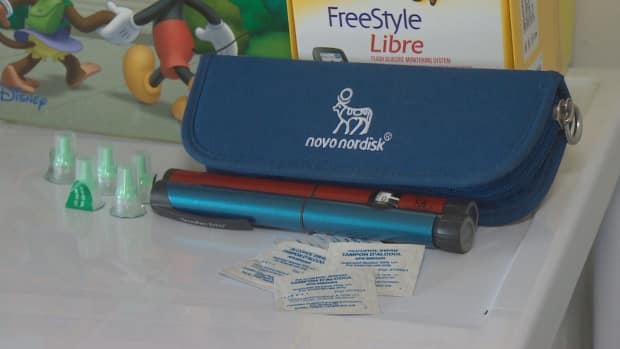5-year-old with diabetes goes without lunchtime insulin with care plan in limbo

A Halifax mother is calling on the Nova Scotia government to mandate that every school that requires it have a medical professional on site to administer insulin in the absence of an individual care plan.
Under the current guidelines, implemented in 2010, school staff can be trained to monitor blood glucose levels and supervise insulin injection. They're not required to be trained to administer the injection.
"It doesn't make any sense to me," said Carrie Dean, whose five-year-old son, Bellemey DesRoche, was diagnosed with Type 1 diabetes late last year.
"He's in primary, and he's only four months into [his] diagnosis and the province expects him to be able to self-administer his own insulin and calculate his own carbs and know what his blood glucose means," she said.
After this story was published, Violet MacLeod, a spokesperson for the Department of Education and Early Childhood Development, told CBC News that, "no young child is giving themselves injections at school."
"Injections may be given by a VON [Victorian Order of Nurses], a parent or a family member, or supported by staff. The school works with the families to plan this," she said.
Dean confirmed that she is working on a plan with Bellemey's school, but no plan has been finalized yet, leaving her son in limbo.
Last week, MacLeod told CBC that the province is reviewing its guidelines for standards of care for children with diabetes while at school. She would not say what specific changes are being considered, only that the review is in its final stages.
Needs lunchtime insulin
Like many children newly diagnosed with diabetes, Bellemey started off getting insulin injections at home, before and after school. But based on his target blood glucose levels, he needs an injection every day at lunchtime.

As of March, Bellemey still hasn't gotten on a lunchtime insulin routine. At five years old, and new to his condition, he's scared to self-administer.
The online form for developing an individual plan of care, which is tailored to meet the individual needs of every child with diabetes in the province, says: "School staff are not to administer insulin by injection," and parents or guardians must make an alternate plan if the child is "not able" to self-administer.
"It's basically saying, if he can't do it himself, it's up to me," Dean said, noting she can't make the trip there herself every day.
Bellemey's target blood glucose level is somewhere between four and ten millimoles per litre (mmol/L), but without an insulin injection at lunchtime, it usually sits between 15 and 20.
When his blood sugar is high, Dean said her son can be easily distracted, irritable and cranky.
"If it's in target, he might be able to understand the lesson or not feel so agitated and actually want to do his work, which he does have trouble with most days," she said.

Dean is working with Bellemey's school and nurse liaison to update his individual plan of care to find a way to get him the insulin he needs at lunch every day. That could include hiring someone, though Dean said it's been challenging finding someone who can commit to it daily.
'His right to choose'
Nova Scotia has an insulin pump program to help families cover the cost, but insulin pumps aren't for everyone.
Though Bellemey does qualify for an insulin pump, he's "absolutely terrified" of them.
"It's his right to choose how he gets his medication, and he chooses by pen," Dean said, noting that she's in the process of filing a complaint with the Nova Scotia Human Rights Commission.

She's also written to her MLA, and has reached out to the IWK hospital in Halifax and Diabetes Canada to bring awareness to the issue.
'An issue of discrimination'
According to Joan King, government relations director with Diabetes Canada, this issue is common across Canada. She heard of a similar issue in Alberta in recent months, where someone in the school agreed to assist with insulin until the school administration found out and "kiboshed" it.
"Everybody wants the best for their children or their students. But not everyone will step up to the plate and volunteer to do something like this," she said.
King said to her knowledge, British Columbia is the only province that requires someone in the school to be trained to administer insulin.
Diabetes Canada has been advocating for this to change for years. King said she's pleased all provinces now have policies or standards of care for kids with Type 1 diabetes, but calls it a "grave oversight" that most of them do not require someone on site be trained to administer insulin.
"I think it is an issue of discrimination, and that this child is not receiving the same opportunity at school [as] kids without diabetes," King said, noting a child's capacity to learn and participate is compromised when their blood sugar is running high.
King said it likely boils down to a fear of injections, although most schools will help inject an EpiPen in the case of a severe allergic reaction. Insulin dosing, while "particular," can be done with training.

She'd like to see schools get support from school boards and provinces to bring in health-care professionals to train school staff and raise awareness about diabetes and complications that could arise.
"We don't expect teachers to be the ones responsible for this. But we do expect that a school and the school district and the province resolve this and indicate who could be able to do this and who should be doing this," she said.
Nova Scotia's review of its guidelines is being done in collaboration with the Diabetes Care Program, Nova Scotia Health, and the IWK School Partnership Committee to ensure they follow the most recent standards of care laid out by the Canadian Diabetes Association, according to MacLeod.
MacLeod said the reviewed guidelines are expected to be ready by the new school year.
MORE TOP STORIES

